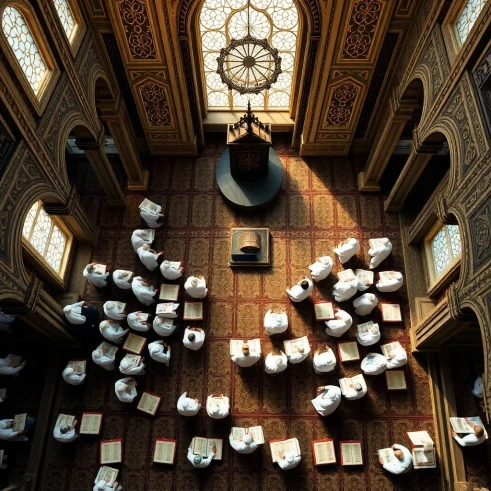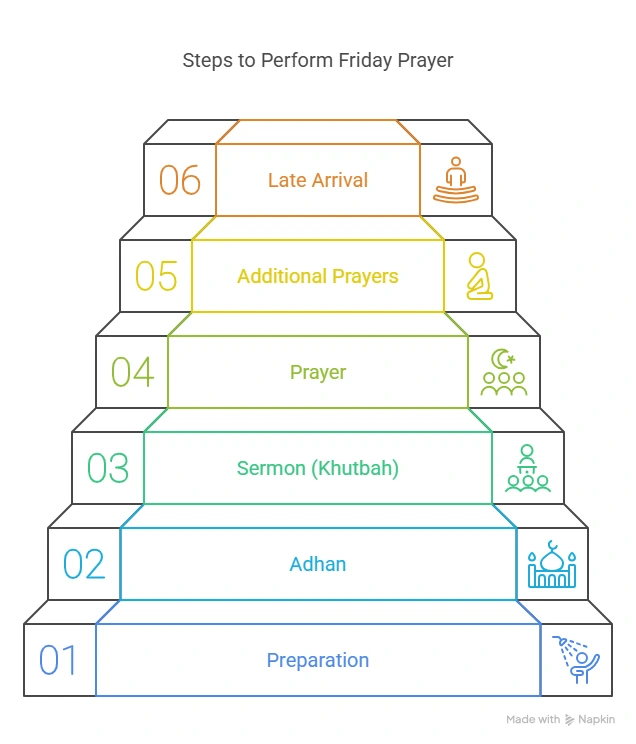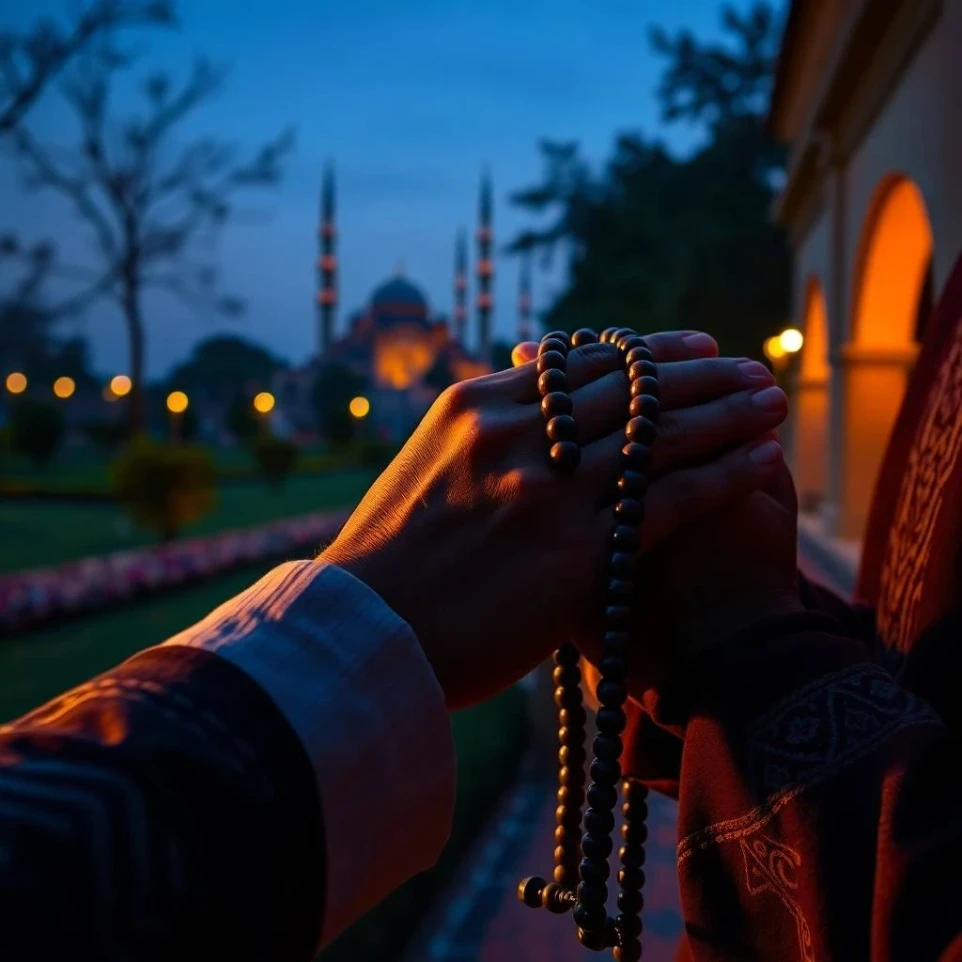Value of Friday Prayer in Islam
Value of Friday Prayer in Islam (Jumu’ah) Friday Prayer is a weekly congregational prayer for Muslims, held every Friday, and is obligatory for adult Muslim men. It includes a sermon (khutbah) and a two-Rak’ah prayer, replacing the Zuhr prayer. Recommended practices include reciting Surah Al-Kahf, sending blessings upon Prophet Muhammad, making du’as, and performing Dhikr. Women are not obliged to attend but can participate if they wish, and specific Duas and Surahs enhance the spiritual experience.
Significance of Friday Prayer

Friday holds a special status in Islam, often described as the best day of the week. The Quran, in Surah Al-Jumu’ah (62:9-10), states:
“O you who have believed, proceed to the remembrance of Allah and leave trade when [the adhan] is called for the prayer on the day of Jumu’ah [Friday].” That is better for you, if you only knew. And when the prayer has been concluded, disperse within the land and seek from the bounty of Allah, and remember Allah often that you may succeed.”
This verse underscores the priority of Jumu’ah over worldly affairs, suggesting its spiritual significance. Hadiths further enhance this, with the Prophet Muhammad (peace be upon him) stating, as narrated by Ahmad and at-Tirmidhi:
The best day on which the sun has risen is Friday; on it Adam was created, on it he was made to enter Paradise, on it he was expelled from it, and the Last Hour will take place on no day other than Friday.”
Islamic scholar Ibn Qayyim al-Jawziyya lists 32 reasons for Friday’s special status, including beliefs that it was the day Adam entered and was expelled from Paradise and that the Day of Judgment will occur on this day ([Friday prayer](https://en.wikipedia.org/wiki/Friday_prayer)). Additionally, a hadith (narrated by al-Bukhari) suggests there is an hour on Friday when du’as are accepted, believed to be after Asr, adding to its spiritual allure.
The communal aspect is also significant, as Jumu’ah brings Muslims together, fostering unity and equality. In many Muslim-majority countries, Friday is part of the weekend, with schools and workplaces often observing half-days, reflecting its cultural and religious importance.
How to Perform Friday Prayer
The performance of Friday Prayer involves specific steps, as detailed in Islamic texts. Below is a structured guide.

The khutbah is a key component, with the imam providing guidance on Islamic teachings and community matters. The prayer itself is shorter than daily prayers, consisting of two Rak’ahs, but its congregational nature and the sermon make it distinct. For latecomers, joining during the sermon is acceptable, and if missed, Zuhr must be performed, ensuring continuity in worship.
Related Duas, Surahs, and Dhikr

Friday is a day for increased worship, with specific recommendations for Duas, Surahs, and Dhikr. These practices enhance the spiritual experience and are supported by Hadith and scholarly consensus.
Sending Blessings Upon the Prophet
It is highly recommended to send blessings upon Prophet Muhammad (peace be upon him) on Fridays. A common form is
“Allahumma salli ‘ala Muhammadin wa ‘ala ali Muhammadin kama sallaita ‘ala Ibrahim wa ‘ala ali Ibrahim, innaka Hammdun Majeed. Allahumma barik ‘ala Muhammadin wa ‘ala ali Muhammadin kama barakta ‘ala Ibrahim wa ‘ala ali Ibrahim, innaka Hammdun Majeed.”
O Allah, send Your mercy on Muhammad and on the family of Muhammad as You sent Your mercy on Ibrahim and on the family of Ibrahim, for You are the Most Praise-worthy, the Most Glorious. O Allah, send Your Blessings on Muhammad and on the family of Muhammad as You sent Your Blessings on Ibrahim and on the family of Ibrahim, for You are the Most Praise-worthy, the Most Glorious.)
Reciting Surah Al-Kahf

ٱلحَمْدُ لِلَّهِ ٱلَّذِيٓ أَنزَلَ عَلَىٰ عَبْدِهِ ٱلْكِتَٰبَ وَلَمْ يَجْعَل لَّهُۥ عِوَجًا
[All] Praise is [due] to Allah, who has sent down upon His Servant the Book and has not made therein any deviance.
قَيِّمٗا لِّيُنذِرَ بَأْسٗا شَدِيدٗا مِّن لَّدُنْهُ وَيُبَشِّرَ ٱلْمُؤْمِنِينَ ٱلَّذِينَ يَعْمَلُونَ ٱلصَّـٰلِحَٰتِ أَنَّ لَهُمْ أَجْرًا حَسَنًا
[He has made it] straight to warn of severe punishment from Him and to give good tidings to the believers who do righteous deeds that they will have a good reward.
مَّـٰكِثِينَ فِيهِ أَبَدٗا
in which they will remain forever.
وَيُنذِرَ ٱلَّذِينَ قَالُواْ ٱتَّخَذَ ٱللَّهُ وَلَدٗا
And to warn those who say, “Allah has taken a son.”
مَّا لَهُم بِهِۦ مِنْ عِلْمٖ وَلَا لِأٓبَآئِهِمْ كَبُرَتْ كَلِمَةٗ تَخْرُجُ مِنْ أَفْوَٰهِهِمْ إِن يَقُولُونَ إِلَّا كَذِبًا
They have no knowledge of it, nor did their fathers. Grave is the word that comes out of their mouths; they speak nothing but a lie.
Reciting Surah Al-Kahf (Chapter 18) on Fridays is a Sunnah practice, with a hadith (narrated by al-Hakim, classed as sahih by al-Albani) stating:
“Whoever recites Surah Al-Kahf on Friday, Allah will build for him a palace in Paradise.”
This practice is believed to bring light and blessings from one Friday to the next, making it a popular tradition among Muslims.
Making Duas:
Friday is considered a day when du’as are more likely to be accepted, especially during specific times. A hadith (narrated by al-Bukhari and Muslim) suggests an hour on Friday, likely after Asr, when du’as are granted. Examples include:
“Allahumma inni as’aluka al-‘afwa wal-‘afiyah fid-dunya wal-akhirah.”
(O Allah, I ask You for forgiveness and well-being in this life and the hereafter.)
Making du’as throughout the day is encouraged, with general supplications for forgiveness, guidance, and well-being being particularly beneficial.
Dhikr:
Regular dhikr, such as “SubhanAllah” (Glory be to Allah), “Alhamdulillah” (Praise be to Allah), and “Allahu Akbar” (Allah is the Greatest), should be increased on Fridays. These acts of remembrance are mustahabb (recommended) on other days but are even more encouraged on this blessed day, as per an-Nawawi’s Al-Adhkar.
These practices not only enhance the spiritual value of Friday but also align with the Quranic injunction to “remember Allah often that you may succeed” (Surah Al-Jumu’ah, 62:10).
Frequently Asked Questions (FAQs) about Friday Prayer
Conclusion
Friday Prayer (Jumu’ah) is a vital practice in Islam, combining worship, community, and spiritual growth. By attending regularly, reciting Surah Al-Kahf, sending blessings upon the Prophet, making du’as, and performing Dhikr, Muslims can maximize the blessings of this day. It is a time to renew faith, strengthen community bonds, and seek Allah’s forgiveness and guidance. Let us embrace Jumu’ah as an opportunity for spiritual elevation and communal harmony, ensuring it remains a cornerstone of our religious life.





